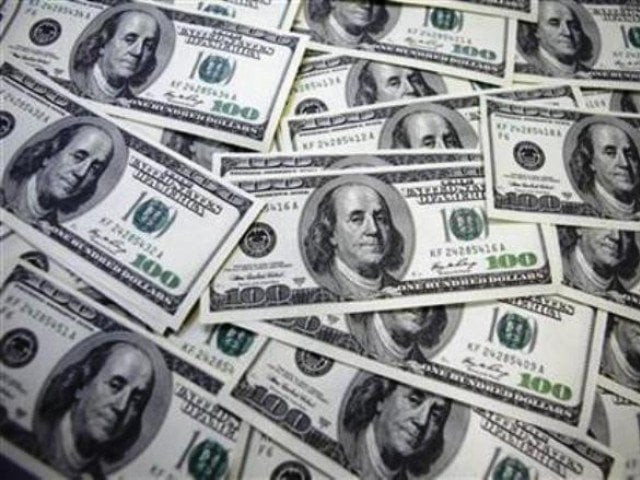Unable to implement reforms: Pakistan gets less-than-projected foreign assistance
Receives $4.3b, 57% of the budgeted amount of $7.44b

As of June 12 this year, the domestic budgetary borrowings increased to Rs894 billion - three times more than the comparative period of last year. PHOTO: REUTERS
In what is an indication of the government’s inability to introduce promised reforms and address bureaucratic snags, Pakistan has so far received only $4.3 billion - 57% of its annual projections - in foreign economic assistance.
Failure or delay in meeting conditions of foreign loans has resulted in the country receiving less than what it had initially projected.
Total provisional disbursements from July through May of outgoing fiscal year stood at $4.3 billion against the annual budgeted amount of $7.44 billion, according to documents of the Economic Affairs Division (EAD).
The gap between the budgeted amount and actual receipts belies the Ministry of Finance’s claim that international lenders are willing to extend loans due to the economic policies of the PML-N government.
The government is expecting that the figure will inch up to roughly $5.2 billion, as the World Bank (WB) has approved two loans amounting to $688 million in June. Yet the annual disbursements will be slightly over two-thirds of the projected receipts.
Read: Market watch: Index slips below 34,000 points
Due to less than anticipated economic assistance, many foreign-funded important projects will be delayed this year again, said the officials of the Ministry of Planning and Development. The non-materialisation of budgetary support from the Asian Development Bank and WB will increase the government’s reliance on domestic borrowings, which is already skyrocketing.
As of June 12 this year, the domestic budgetary borrowings increased to Rs894 billion - three times more than the comparative period of last year, according to State Bank of Pakistan.
The officials said that bureaucratic hurdles were the main reasons behind slow disbursements of foreign economic assistance. The delay in approval of PC-Is of the projects and slow procurements were disturbing the flow of foreign funds, the officials added.
The solution?
In order to address these challenges, Prime Minister Nawaz Sharif has decided to set up a Project Monitoring and Implementation Cell in the PM Office, according to officials.
This indicates that a similar cell working in Planning Commission (PC) has virtually collapsed. Shahid Chaudhry, who is working in MP-I scale, is Member Implementation and Monitoring of the PC whose sole job is to keep track of progress on projects and ensure implementation as per planning.
The PC often approves half-baked PC-Is of the projects, which create many problems during the implementation of these projects. In the outgoing fiscal year, the Central Development Working Party (CDWP) considered 322 projects and it returned only four schemes due to various reasons, according to PC documents.
Out of Rs525 billon Public Sector Development Programme for fiscal year 2014-15, the government had estimated that Rs192 billion would be provided by foreign lenders. However, as of May-end, foreign lenders gave Rs126 billion or $1.24 billion.
According to the EAD, the ADB gave $412.4 million in loans from July through May, which was only 38% of the annual estimates of $1.1 billion. The ADB has delayed the approval of $400 million budgetary support for energy sector due to non-implementation of prior conditions.
Read: Pakistan looks for lenders’ largesse
The WB also gave only $353 million or less than one-fifth of annual estimates of $1.9 billion. The WB too has postponed the approval of $500 million for energy sector reforms.
China has provided $846.1 million, which is slightly less than half of the annual estimates of $1.5 billion.
The Islamic Development Bank was the only multilateral institution that gave more than the annual estimates. The country received $990 million from the IDB, which was 171% of the annual projections. The IDB gave a one-year loan amounting to $864.7 million for crude oil imports, which is expensive and the government plans to get it rolled over to the new fiscal year.
The United Kingdom was the only country that gave more than what it promised. The UK extended $255.7 million in grant to Pakistan in the outgoing fiscal year as against estimates of $245.7 million. In contrast to this, the United States gave only $95.2 million or 27% of the annual projections, according to the EAD.
A $1-billion loan raised through issuing a Sukuk bond is also part of $4.3 billion foreign economic assistance that Pakistan received from July through May.
Published in The Express Tribune, June 27th, 2015.
Like Business on Facebook, follow @TribuneBiz on Twitter to stay informed and join in the conversation.



















COMMENTS
Comments are moderated and generally will be posted if they are on-topic and not abusive.
For more information, please see our Comments FAQ